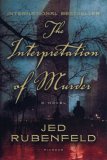Summary | Excerpt | Reading Guide | Reviews | Beyond the Book | Readalikes | Genres & Themes | Author Bio

A Novel
by Jed Rubenfeld
“There is train below river?” asked Sándor Ferenczi
incredulously.
Not only did such a train exist, Brill and I assured him, but we
were going to ride it. In addition to the new tunnel across the
Hudson River, the Hoboken tube boasted another innovation: full
baggage service. All a voyager arriving in the United States had
to do was mark his luggage with the name of his hotel in
Manhattan. Porters stowed the trunks in the train’s baggage car,
and handlers on the other end did the rest. Taking advantage of
this amenity, we walked out onto the platform, which overlooked
the river. With the setting of the sun, the fog had lifted,
revealing the jagged Manhattan skyline, studded with electric
lights. Our guests stared in wonder: at the sheer expanse of it,
and at the spires piercing the clouds.
“It’s the center of the world,” said Brill.
“I dreamt of Rome last night,” Freud replied.
We waited on pins and needles—at least I did—for him to go on.
Freud drew on his cigar. “I was walking, alone,” he said. “Night
had just fallen, as it has now. I came upon a shop window with a
jewelry box. That of course means a woman. I looked around. To
my embarrassment, I had wandered into an entire neighborhood of
bordellos.”
A debate ensued on whether Freud’s teachings dictated defiance
of conventional sexual morality. Jung held that they did;
indeed, he maintained that anyone who failed to see this
implication had not understood Freud. The whole point of
psychoanalysis, he said, was that society’s prohibitions were
ignorant and unhealthy. Only cowardice would make men submit to
civilized morality once they had understood Freud’s discoveries.
Brill and Ferenczi vigorously disagreed. Psychoanalysis demanded
that a man be conscious of his true sexual wishes, not that he
succumb to them. “When we hear a patient’s dream,” said Brill,
“we interpret it. We don’t tell the patient to fulfill the
wishes he is unconsciously expressing. I don’t, at any rate. Do
you, Jung?”
I noticed both Brill and Ferenczi sneaking glances at Freud as
they elaborated his ideas—hoping, I supposed, to find
endorsement. Jung never did. He either had, or affected having,
perfect confidence in his position. As for Freud, he intervened
on neither side, apparently content to watch the debate unfold.
“Some dreams do not require interpretation,” Jung said; “they
require action. Consider Herr Professor Freud’s dream last night
of prostitutes. The meaning is not in doubt: suppressed libido,
stimulated by our anticipated arrival in a new world. There is
no point talking about such a dream.” Here Jung turned to Freud.
“Why not act on it? We are in America; we can do what we like.”
For the first time, Freud broke in: “I am a married man, Jung.”
“So am I,” Jung replied.
Freud raised an eyebrow, nodding, but made no reply. I informed
our party that it was time to board the train. Freud took a last
look over the railing. A stiff wind blew in our faces. As we all
gazed at the lights of Manhattan, he smiled. “If they only knew
what we are bringing them.”
Copyright © 2006 by Jed Rubenfeld




It is among the commonplaces of education that we often first cut off the living root and then try to replace its ...
Click Here to find out who said this, as well as discovering other famous literary quotes!
Your guide toexceptional books
BookBrowse seeks out and recommends the best in contemporary fiction and nonfiction—books that not only engage and entertain but also deepen our understanding of ourselves and the world around us.